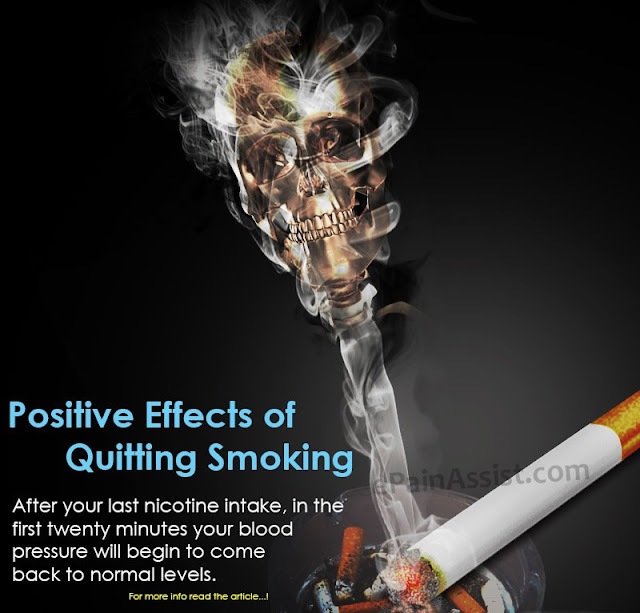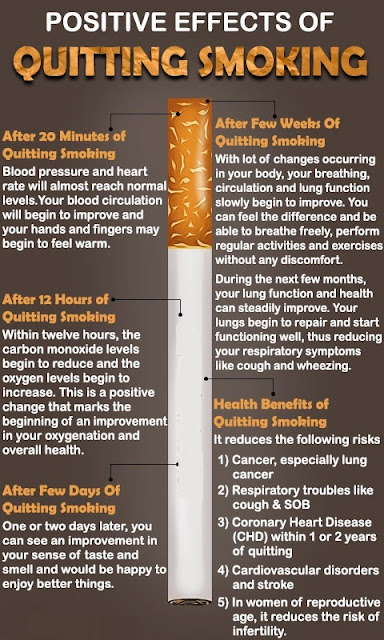Are you planning to quit smoking in 2018? Not sure of what will happen? All you need is your will to quit and the rest will follow. Anytime is just perfect to quit smoking; so why not now? And yes, you don't have to wait for long to see the after effects of quitting smoking.
You may have heard a great deal about nicotine withdrawal symptoms and changes that your body may undergo after quitting. Lots of questions may be troubling your mind about its effects on your health and its relation with reduced risk of health problems. Knowing about the after effects of quitting smoking can help you to deal with it in a better way.
Quit Smoking - Stepwise Effects On Body And Overall Health
The withdrawal symptoms experienced after quitting are nothing but a way in which your body reacts to the dependency on nicotine present in tobacco. All the while, when you have been smoking, the chemical nicotine in tobacco was playing its role of maintaining the addiction. When you attempt to quit smoking, the level of nicotine begins to drop. This gives rise to symptoms like nausea, headache, anxiety and a craving for more tobacco springs up.
However, these symptoms are most troublesome during the initial period and later on become manageable. It is true that the initial days may be difficult, but when continued with a strong will, you are sure to feel comfortable after few weeks.
Effect On Body After 20 Minutes Of Quitting Smoking:
After your last nicotine intake, in the first twenty minutes your blood pressure will begin to come back to normal levels. This is the most immediate effect you can notice. In the next two hours of you having quit, your blood pressure and heart rate will almost reach normal levels. Your blood circulation will begin to improve and your hands and fingers may begin to feel warm.
By this time, the withdrawal symptoms can pop up and you may experience strong craving for more nicotine. Other symptoms include increased anxiety, irritability, restlessness and frustration, difficulty in sleeping and boosted appetite.
Effect On Health After 12 Hours Of Quitting Smoking:
Within twelve hours after having quit, there is a major positive change happening in your body. When you had been smoking, you were inhaling carbon monoxide, which is released from burning tobacco. This substance is potentially dangerous, as it binds with blood cells and leaves no room for oxygen to bind with blood cells. Lack of proper oxygenation places you at an increased risk of cardiovascular and other lifestyle disorders.
Within twelve hours, the carbon monoxide levels begin to reduce and the oxygen levels begin to increase. This is a positive change that marks the beginning of an improvement in your oxygenation and overall health.
Positive Effects That Can Be Seen After Few Days Of Quitting Smoking
One or two days later, you can see an improvement in your sense of taste and smell and would be happy to enjoy better things. In the next few days, as nicotine is being completely flushed out of your body, you may experience an up-surge in the withdrawal symptoms. While headache, nausea can be troublesome, increased stress and anxiety, inability to concentrate can make the situation difficult.
Positive Effects That Can Be Seen After Few Weeks Of Quitting Smoking
With lot of changes occurring in your body, your breathing, circulation and lung function slowly begin to improve. You can feel the difference and be able to breathe freely, perform regular activities and exercises without any discomfort.
During the next few months, your lung function and health can steadily improve. Your lungs begin to repair and start functioning well, thus reducing your respiratory symptoms like cough and wheezing. Most withdrawal symptoms fade away and you can begin experiencing the positive health benefits of quitting.
Health Benefits of Quitting Smoking
Some Health Benefits Associated With Cessation Of Smoking Include:
- It reduces the risk of many types of cancer including lung cancer
- It reduces the risk of respiratory troubles like cough, shortness of breath or wheezing.
- It offers better sustained lung function and reduced risk of respiratory disorders like Chronic Obstructive Pulmonary Disease (COPD)
- It lowers the risk of cardiovascular disorders, peripheral vascular disease and stroke
- It reduces the risk of Coronary Heart Disease (CHD) within 1 or 2 years of quitting
- In women of reproductive age, it reduces the risk of infertility. In pregnant women, quitting can help to reduce the risk of having a low birth weight baby.
At every step, you need to hold on to your smoking cessation program and reward yourself for having come so far. You can possibly treat yourself with your favorite book or an outing to admire the nature. Counseling and medications are found to be helpful in fighting with nicotine dependence and you can seek medical advice on the same. Support groups can be of great help and success stories of those who have quit smoking can help to keep up your motivation.


